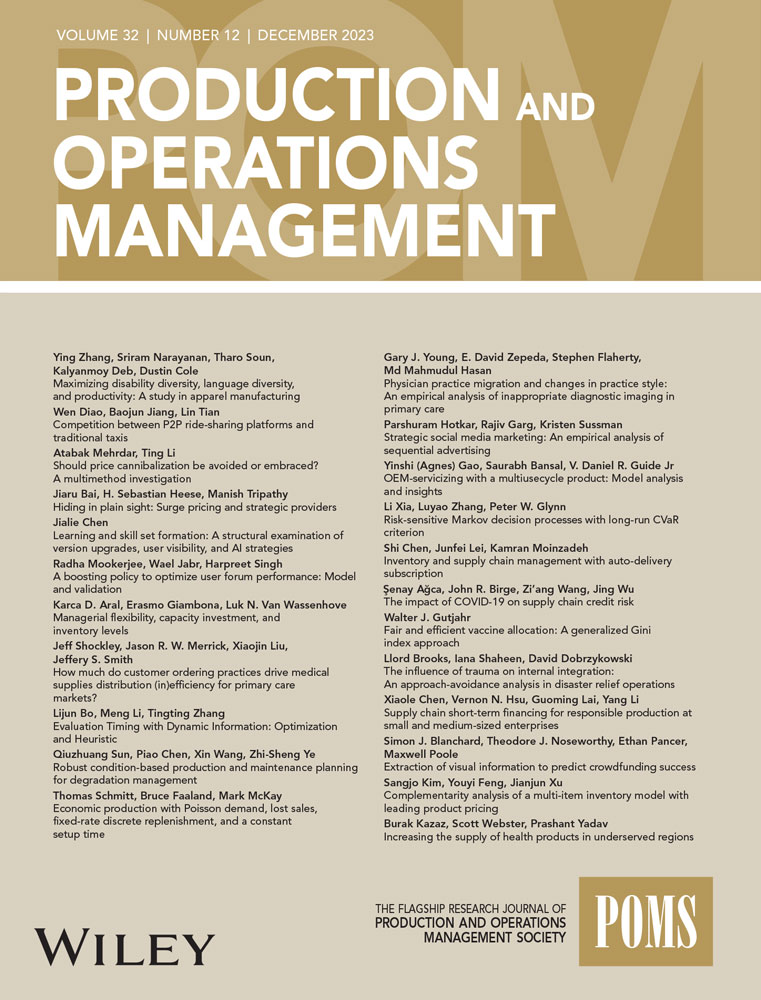Extraction of visual information to predict crowdfunding success
IF 5.1
3区 管理学
Q1 ENGINEERING, MANUFACTURING
引用次数: 0
Abstract
Abstract Researchers have increasingly turned to crowdfunding platforms to gain insights into entrepreneurial activity and dynamics. While previous studies have explored various factors influencing crowdfunding success, such as technology, communication, and marketing strategies, the role of visual elements that can be automatically extracted from images has received less attention. This is surprising, considering that crowdfunding platforms emphasize the importance of attention‐grabbing and high‐resolution images, and previous research has shown that image characteristics can significantly impact product evaluations. Indeed, a comprehensive review of empirical articles ( n = 202) utilized Kickstarter data, focusing on the incorporation of visual information in their analyses. Our findings reveal that only 29.70% controlled for the number of images, and less than 12% considered any image details. In this manuscript, we contribute to the existing literature by emphasizing the significance of visual characteristics as essential variables in empirical investigations of crowdfunding success. We review the literature on image processing and its relevance to the business domain, highlighting two types of visual variables: visual counts (number of pictures and number of videos) and image details. Building upon previous work that discussed the role of color, composition, and figure–ground relationships, we introduce visual scene elements that have not yet been explored in crowdfunding, including the number of faces, the number of concepts depicted, and the ease of identifying those concepts. To demonstrate the predictive value of visual counts and image details, we analyze Kickstarter data using flexible machine learning models (Lasso, Ridge, Bayesian additive regression trees, and eXtreme Gradient Boosting). Our results highlight that visual count features are two of the top three predictors of success and highlight the ease at which researchers can incorporate some information about visual information. Our results also show that simple image detail features such as color matter a lot, and our proposed measures of visual scene elements can also be useful. By supplementing our article with R and Python codes that help authors extract image details ( https://osf.io/ujnzp/ ), we hope to stimulate scholars in various disciplines to consider visual information data in their empirical research and enhance the impact of visual cues on crowdfunding success.提取视觉信息预测众筹成功
研究人员越来越多地转向众筹平台,以深入了解创业活动和动态。虽然之前的研究探讨了影响众筹成功的各种因素,如技术、传播、营销策略等,但可以从图像中自动提取的视觉元素的作用却很少受到关注。这是令人惊讶的,考虑到众筹平台强调吸引注意力和高分辨率图像的重要性,之前的研究表明,图像特征可以显著影响产品评估。事实上,有一篇综合分析实证文章(n = 202)利用了Kickstarter的数据,重点是在分析中结合视觉信息。我们的研究结果表明,只有29.70%的人控制了图像的数量,不到12%的人考虑了图像的任何细节。在本文中,我们通过强调视觉特征作为众筹成功实证调查中必不可少的变量的重要性,对现有文献做出了贡献。我们回顾了关于图像处理及其与商业领域的相关性的文献,强调了两种类型的视觉变量:视觉计数(图片数量和视频数量)和图像细节。建立在以前的工作,讨论了颜色,构图和图形-地面关系的作用,我们介绍了尚未在众筹中探索的视觉场景元素,包括面孔的数量,所描绘的概念的数量,以及识别这些概念的便利性。为了证明视觉计数和图像细节的预测价值,我们使用灵活的机器学习模型(Lasso, Ridge, Bayesian加性回归树和eXtreme Gradient Boosting)分析Kickstarter数据。我们的研究结果强调了视觉计数特征是成功的前三个预测因素中的两个,并强调了研究人员可以轻松地将一些关于视觉信息的信息结合起来。我们的研究结果还表明,简单的图像细节特征(如颜色)也很重要,我们提出的视觉场景元素度量方法也很有用。通过在我们的文章中补充R和Python代码,帮助作者提取图像细节(https://osf.io/ujnzp/),我们希望激发各个学科的学者在他们的实证研究中考虑视觉信息数据,并增强视觉线索对众筹成功的影响。
本文章由计算机程序翻译,如有差异,请以英文原文为准。
求助全文
约1分钟内获得全文
求助全文
来源期刊

Production and Operations Management
管理科学-工程:制造
CiteScore
7.50
自引率
16.00%
发文量
278
审稿时长
24 months
期刊介绍:
The mission of Production and Operations Management is to serve as the flagship research journal in operations management in manufacturing and services. The journal publishes scientific research into the problems, interest, and concerns of managers who manage product and process design, operations, and supply chains. It covers all topics in product and process design, operations, and supply chain management and welcomes papers using any research paradigm.
 求助内容:
求助内容: 应助结果提醒方式:
应助结果提醒方式:


